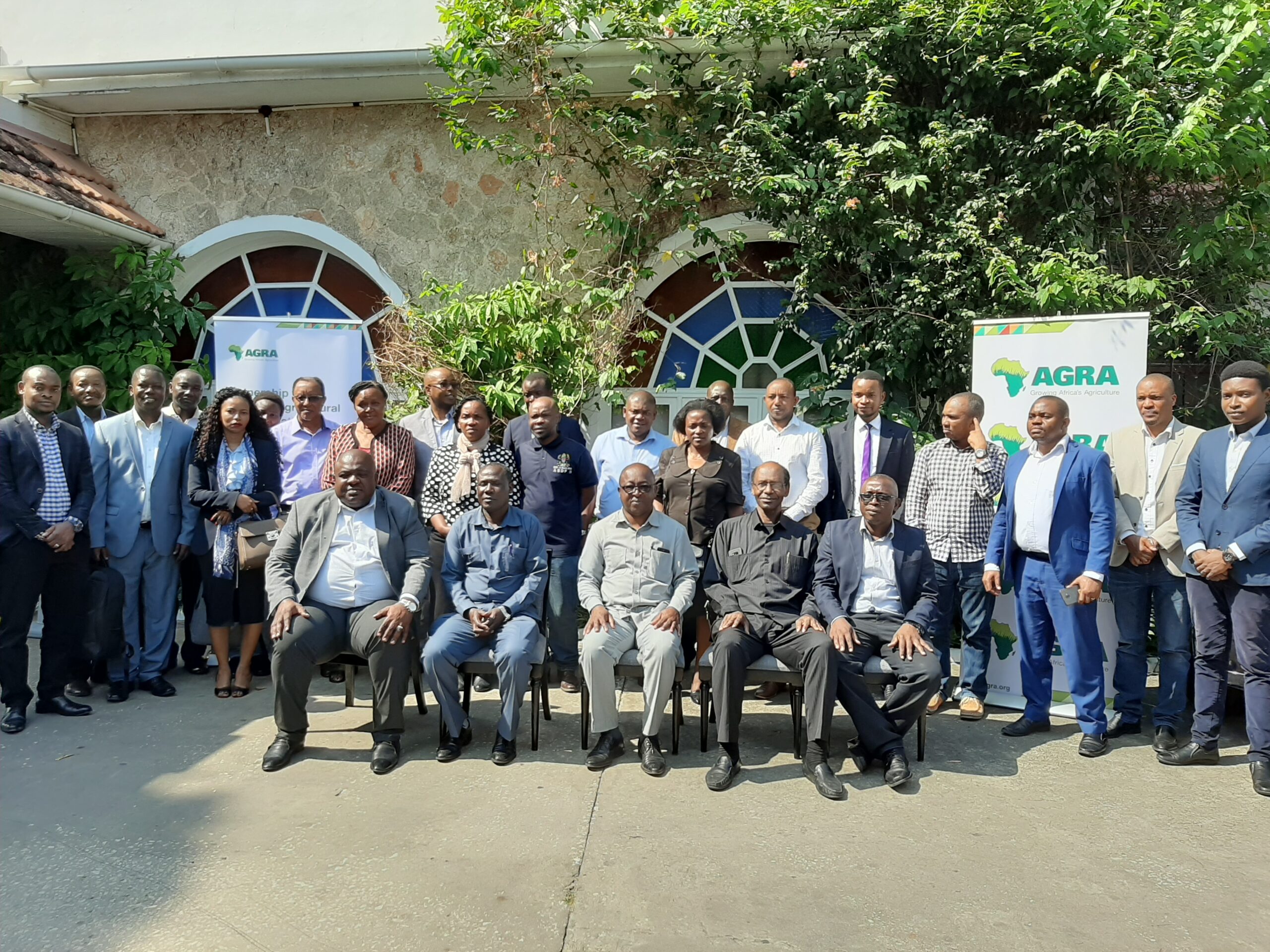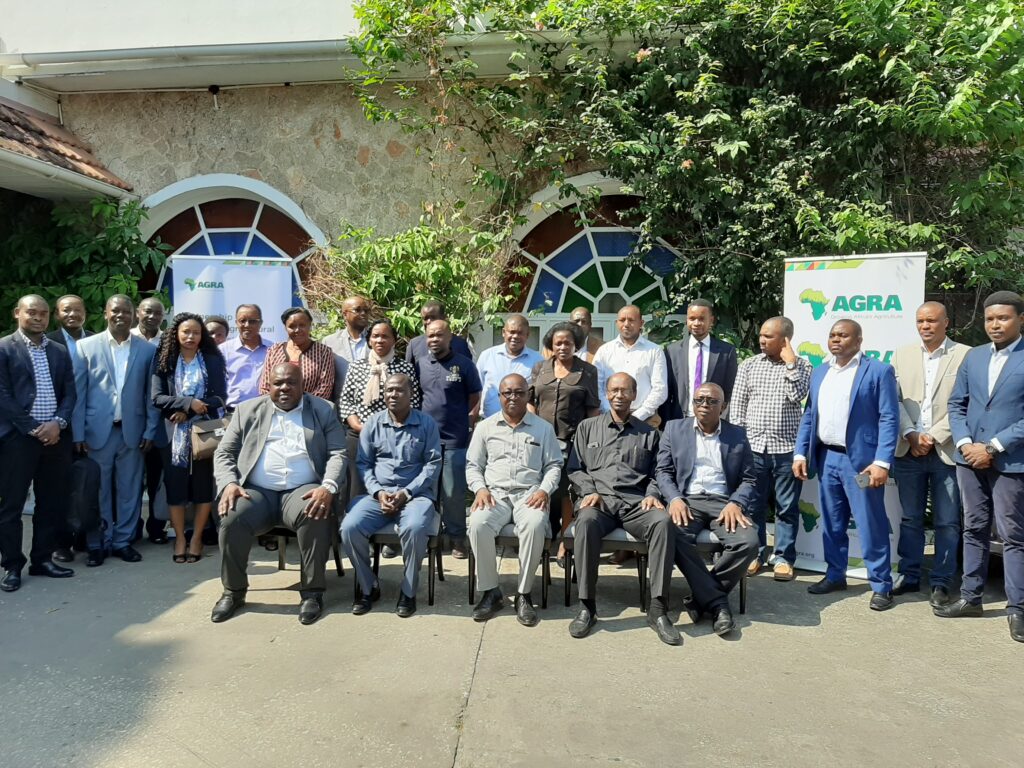
Tanzanians should adequately prepare to pitch their agribusinesses in a novel platform that will connect investment-ready agricultural companies and projects to financiers, business services, and ecosystem partners from around the world.
The remarks were made by the Deputy Permanent Secretary in the Ministry of Agriculture, Prof Siza Tumbo in Dar es Salaam, 10/08/2020, at a preparatory meeting for the world’s premier forum for African agriculture, the AGRF.
The meeting brought the public and private sector in Tanzania together to prepare for “agribusiness deal room” a landmark side event for matchmaking and will facilitate partnerships and investments in African agriculture, during the upcoming 10th AGRF Summit, which will be held virtually between the 8 – 11 September 2020 under the leadership of H.E. President Paul Kagame (Rwanda).

The deal room at Agrf.org links up private companies with over 50 public and private investors from around the world to explore a wide range of investment opportunities. Prof Siza Tumbo noted that the deal room was vital for Tanzanians in agribusiness so that they can pitch to investors and attract funding/ partnerships that will up private agriculture enterprises in the country.
He urged Tanzanians who want to participate in the deal room to get in touch with the organizers early enough and the government on its side would work with AGRA to look at the needs of Tanzanians in agribusiness and see what can be done at the event.
According to Prof Tumbo there are many emerging opportunities for Tanzanians doing business in agriculture especially as outlined in the country’s development roadmap for the sector known as Agriculture Sector Development Programme II (ASDP II). Component 3, he noted is about commercialization and Value Addition (building competitive commodity value chains), which requires the use of improved technologies.
He noted that there are some needs for investments in agriculture and the financing can be realized within Tanzania, the question was for the private sector to see and pursue available opportunities and take the necessary steps. However, he noted, there are other needs, for example, investments in technology, it is a must for Tanzanians to open up their eyes, see the needs, and pitch their businesses, to take them to the next level.
Speaking at the same meeting, on his side, Mr. Nicomed Bohay, Managing Director, Private Agriculture Sector Support (PASS), lack of the ability by any business to pitch for funding was a recipe for failure.
He noted that PASS was established to stimulate investment and growth in commercial agriculture and related sectors.
“We have a great capacity to support private sector investments in agriculture directly or indirectly but most of the requests reaching us are unprofessionally presented, leading to failure to get funding,” he noted. From 2000 to March 2020, PASS has offered direct credit and credit guaranteed for about 1,196,871 requests amounting to 916 billion (USD 400M).
Last year alone, PASS benefited 226,689 people by providing guarantees or giving them money in 26 regions across the country. In the same year (2019) PASS supported the development of 10,666 business plans worth Sh 129 billion for pitching up funding at diverse finance institutions.
Mr. Bohay, noted that PASS, which works closely with the Sokoine University of Agriculture (SUA) and Tanzania Livestock Research Institute (TALIRI) will participate at AGRF Summit deal room, to connect with institutions that offer fund to smallholder farmers and those who want to facilitate financing to upscale agribusiness in Tanzania.
Mr. Vianey Rweyendela, AGRA Country Manager (Tanzania) told the meeting that the 10th AGRF Summit www.agrf.org , will bring together over thousands of delegates from governments, the civil society, the private sector, research community, and development partners from across the world and it will be held virtually from 8-11 September 2020 and will be co-hosted by the Government of Rwanda and the AGRF Partners Group.
Mr. Rweyendela said he was optimistic Tanzania public and private sector would participate fully in the summit including the deal room.
“The response to the preparatory meeting is a good indicator as it has brought together many stakeholders- government officials, policymakers and private sector,” he said.
He appreciated the participation of the Tanzania Investment Centre (TIC), the Primary Agency of the Government to coordinate, encourage, promote, and facilitate investment in Tanzania, in the deal room.
“TIC is best placed to showcase the investment opportunities in the country in the international forum as well as bringing Tanzania’s together who want to pitch at the deal room and make connections with financiers or partners,” he said.
“Tanzania has exceptionally attractive investment opportunities in agriculture and livestock sectors,” Ms. Diana Ladislaus Mwamanga, TIC representative, had said earlier at the meeting.
Tanzanians should talk confidently with foreign investors with the aim of entering into joint ventures or producing their own products that will benefit the agricultural and livestock value chain, she advised.
“Tanzania has improved the investment climate. Many levies and charges in the agriculture sector have been done away with,” she noted, and added that fishery regulations have also been changed, loopholes sealed so as to attract more investments,” she noted.
She called on Tanzanians who want to succeed in pitching up projects at the Agribusiness Deal Room to understand the changing nature of the investment climate. Tanzania offers many incentives to investors – both those that want to invest directly or through various collaboration models.
She told Tanzanians to have in mind considerations investors are looking for before investing, which include the country being a haven of peace, security, stability, and democracy, hence ideal.
She noted consistent economic growth, low inflation, a huge reservoir of natural resources for tourism, agriculture, natural gas, minerals, etc and an excellent natural environment makes Tanzania a suitable destination for investors.
Tanzania is also strategically surrounded by eight nations and three major ports serving 6 countries, three international airports and a market for 177 million people in East Africa, SADC 342 million people, with 650 million people in the Tripartite Free Trade Area (TFTA) – the proposed African free trade agreement between the Common Market for Eastern and Southern Africa (COMESA) market and AGOA market with 6000 products as well as the European market. Such factors among others make the nation a very attractive investment destination.
Dr. Salim Nandonde, the coordinator of ASDPll, noted that Tanzania agriculture had a huge investment potential. ASDP 11 clusters 3 has project opportunities worth $ 2.5 billion. If Tanzanians use the agribusiness room well and successfully pitch their projects, it will push to higher levels the implementation of ASDP 11.
Director of Policy Ministry of Livestock and Fisheries Dr. Andrew Komba noted that in the past there was an outcry about an unfriendly regulatory regime as a hindrance to agriculture and livestock sector development.
“We have made major framework changes in facilitating investments. We have improved the business environment after the government abolished over 105 levies,” he said, adding that amendments were also made to make open sea fishing more accessible to Tanzanians.
The Ministry of Finance and Planning 2020/2021 budget clearly identified and abolished some levies and made investment more friendly.
He said it is important to look at the technology that will enable deep-sea fishing that most Tanzanians currently do not have. He urged Tanzanians to pitch in the deal room for projects that will bring in modern fishing technology, including deep-sea fishing.
“The recent changes are geared to improving the business environment for the agricultural and livestock sectors to grow. There are many investment opportunities and the business environment is more friendly,” he noted.
Some speakers at the session explained that there is a serious problem with access to animal feed which presents huge business opportunities in modern processing of livestock feed.
Technological challenges were attributed to contributing to the problem. For example, it was noted the current technology used in sunflower oil extracting leaves a lot to be desired. When bought by business people in neighboring Kenya, they fix the situation using improved technology and make good fodder for livestock.
The animal feed crisis was also highlighted by poultry investor AKMG Elizabeth Swai. She said the competition for cereals especially maize for humans and animal food was getting more real. She called on Tanzanians to increase maize production and more so yellow maize for livestock, as well as soybeans, sorghum, and millet.
TPSF’s Victoria Michael encouraged the private sector to use the deal room platform for access to new capital for technology development. “We have so many opportunities in the country, especially in the agriculture sector,” she noted. She urged members of the business community to engage each other before pitching. Only reliable projects should be pitched that can attract investors.
According to Donald Mizambwa, AGRA Program Officer in Tanzania, who is leading the campaign to make the Forum success for Tanzania, the deal room was an ideal marketplace for Tanzanians to pitch their projects and take agribusiness a notch higher, especially in the drive for more production, markets, and industrialization.
Apart from experts’ dialogue on professional issues related to agribusiness and investment, traders and entrepreneurs seeking capital from $ 500 to $ 50 million, will have their day to pitch for funding.
Notes to editors
The AGRF Summit 2020 “Deal Room” will facilitate substantive dialogue and connections among the four key stakeholders: Enterprises, Investors, Governments, AGRF Partners.
This will be achieved through eight underlying components that will be implemented in collaboration with these stakeholders. The components include:
- SME Matchmaking: Meetings between SMEs and investors seeking a wide range of capital needs (from US$100k to US$50m).
- Country Presentations: Opportunities for governments to generate investor interest and engage with key stakeholders.
- Sourcing in Africa: Platform for enterprises and farmer organizations to connect with anchor buyers and traders.
- Knowledge Program: Expert presentations and panels, knowledge sharing sessions and pitches.
- Enabling environment and investment dialogues: public-private problem-solving sessions to address bottlenecks for selected deals.
- Platform of Partners: AGRF and technical partners supporting design and delivery of the Deal Room.
- Virtual Platform: A year round tool enabling stakeholders to exchange contacts and identify common interests.
- Post-AGRF Summit Portfolio Management: A mechanism that will follow up on transactions post-AGRF Summit and potentially offer transaction advisory services
For more information visit
End
